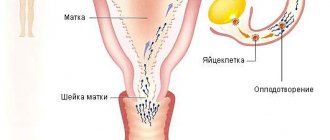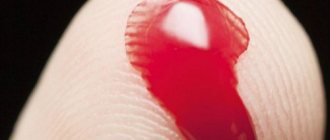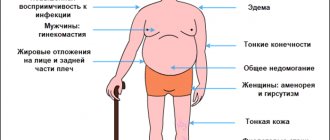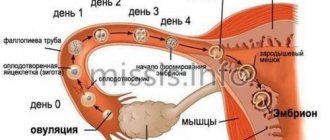According to gynecologists, there cannot be a clear answer to the simple question of whether it is possible to get pregnant during menstruation. To calculate the probability of pregnancy, it is necessary to take into account many factors and individual characteristics of a woman’s health and the period of unprotected sexual intercourse.
It is generally believed that ovulation does not occur during this period, so it is impossible to get pregnant. However, this statement is not entirely true.
It is important to know! Intimacy during bleeding can cause an inflammatory process, since the uterine cavity is an open wound, providing a good environment for the development of bacteria.
Why is it considered impossible to get pregnant during menstruation?
Ovulation is considered a favorable moment for conception (during which an egg is formed). If during this time the woman does not become pregnant, then menstruation occurs, i.e. the egg is destroyed, which prevents conception.
Read the popular site article: Popular birth control pills: list, names, prices, reviews
Therefore, theoretically, it is impossible to get pregnant during menstruation . Is it so? Gynecologists say that there are cases when conception is possible. This is due to the individual characteristics of a woman’s body, as well as external irritants that disrupt the normal functioning of all systems and organs.
Predisposing factors
Many girls wonder on the last day of their period whether it is possible to get pregnant, and doctors unanimously assure that it is unacceptable to have unprotected sex life during menstrual bleeding if conception is not planned. There are also certain predisposing factors that increase the likelihood of fertilization.
First of all, you need to pay attention to the intensity of the discharge, as well as the individual duration of the cycle. For most women, standard calendar schemes for determining dangerous and safe days for conception are not suitable.
On the last day of your period, getting pregnant is extremely likely if the girl’s cycle lasts about 21 days. However, it should not be ruled out that with a standard cycle length and unprotected sexual contact with a partner on the last day of bleeding, conception will not occur.
If you do not want another early pregnancy, doctors advise women who have recently given birth to a child to approach sex with special care. The fact is that after labor, the body is greatly rebuilt, and, accordingly, the previously established cycle undergoes changes. Doctors, answering the question whether it is possible to get pregnant during menstruation in the last days, answer in the affirmative and positively.
There are situations when several eggs mature in the body during one cycle, which is called spontaneous ovulation, then the likelihood of getting pregnant at the end of menstruation also increases.
When does ovulation usually occur?
Ovulation is the process of releasing a mature egg from an ovarian follicle into the abdominal cavity . This period is considered favorable for pregnancy and does not last long, about 2 days.
The moment of ovulation is individual and depends on the duration of the menstrual cycle. Experts say that this period occurs in women 11–21 days from the 1st day of the last menstruation, or for 2 weeks before the start of the next critical days. But sometimes, due to various problems with hormones and stressful situations, ovulation occurs again.
Interesting fact! Several times a year, ovulation may be absent, which indicates the impossibility of getting pregnant not only during menstruation, but also in the period before it. Is this a violation? Gynecologists believe that no, provided that there was regular ovulation in previous periods.
Experts say that the period of ovulation occurs in women 11–21 days from the 1st day of the last menstruation, or for 2 weeks before the start of the next critical days.
There are various ways to determine the onset of ovulation.
These include:
- calendar method (for regular critical days);
- basal method (measuring basal temperature);
- ovulation test.
If ovulation coincides with menstruation, then there is no question of whether it is possible to get pregnant during menstruation, because in this case it is quite likely.
Can conception occur?
There is always a small chance of getting pregnant during your period, but this phenomenon does not happen often.
Ovulation may rarely, but still occur during menstruation. Women who have a regular cycle should not worry about this. However, not everyone's periods go according to schedule. There are cases when bleeding is observed only once every few months or, conversely, several times a month. Then the egg matures in parallel with menstruation. Women themselves may not even be aware of this process.
Ovulation during menstruation occurs when there is a short cycle. Such changes are often recorded during hormonal imbalances, if there are problems with reproductive function or if there are more serious diseases. When the menstrual cycle is disrupted, it is necessary to consult a doctor for help so that he can help determine the reason for this in the body as quickly as possible.
Ovulation during menstruation can occur due to:
- severe stress;
- improper functioning of the reproductive function;
- presence of infectious diseases;
- acclimatization.
Not in all cases, egg maturation is carried out strictly in accordance with normal parameters. To understand how long after menstruation ovulation occurs, it is enough to familiarize yourself with the peculiarities of the functioning of the female reproductive organs. The enlargement of the follicles in which oocytes are formed is carried out under the influence of estrogens.
If they are produced in the required quantity, the follicle grows by 1-2 mm per day. The release of the egg occurs a few days after the follicle becomes mature. By this time it should reach 18-25 mm. If estrogens are produced more actively than usual, the follicles mature earlier. The following factors contribute to this:
- Stressful situations;
- Hormonal disorders;
- Hereditary diseases;
- Metabolic disease;
- Infectious and inflammatory problems.
Stages of egg development
Spontaneous ovulation after menstruation is a common occurrence. In gynecology it is considered a pathology. It provokes a change in the cyclicity of physiological processes and is an obstacle to the successful fertilization of the oocyte. The fertilized egg will not be able to penetrate the upper layers of the uterine cavity, as it will not have time to reach the required volume and structure.
The functioning of the organs responsible for reproduction is regulated by hormonal levels. If it is normal, then the development of the oocyte occurs according to a given algorithm. It is important for anyone who wants to have offspring to know what day after menstruation ovulation occurs. This information will help you prepare for motherhood.
The determining factor when calculating fertile days is the duration of the cycle. While the length of the follicular phase can vary, the luteal phase is always the same. It lasts 2 weeks and begins immediately after the release of the egg. On what day does ovulation begin after menstruation can be determined with the greatest accuracy by women who have regular menstruation. Their oocyte release most often occurs on the same day of the cycle.
Calculation of the menstrual cycle
In other cases, by counting it is possible to obtain only an approximate result. To do this, subtract 14 days from the average cycle length. The resulting number indicates on what day the female body becomes ready to conceive. To predict the average length of the cycle, it is necessary to record menstrual data for 3 months. To do this, you should keep a special calendar. Based on the information received, average indicators are identified.
All processes in a woman’s body occur in a clear sequence. Ovulation without menstruation is impossible. If the process of fusion of the female cell with the sperm does not occur, menstruation will begin 2 weeks after it enters the peritoneal cavity. It becomes mature while in the follicular membrane.
When does ovulation occur after menstruation? Some women claim that pregnancy in their case was triggered by ovulation before menstruation. This statement can be considered true. In gynecology there is a term “late ovulation”. The deviation is accompanied by slow maturation of the egg. For this reason, the first phase of the cycle is delayed.
This provokes problems with the regularity of the cycle. On the days when a woman begins to prepare for her period, she ovulates. With an increase in estrogen, ovulation occurs after menstruation. Unlike late ovulation, it cannot lead to a full pregnancy due to the unprepared endometrium. Early rupture of the follicle can also provoke:
- Lifting weights;
- Taking sage decoction;
- Hormonal drugs;
- Abdominal exercises;
- Hot bath.
Sage
Early ovulation occurs on days 5-10 of the cycle. The earlier it occurs, the lower the likelihood of pregnancy. If the follicular membrane ruptures on days 11-12 of the cycle, fertility increases.
To determine how many days after menstruation ovulation occurs, it takes a long time to observe the body. Each stage of egg growth is accompanied by certain signs. A few days after the end of menstruation, characteristic tingling sensations appear in the appendages. As the follicles grow, the pain may intensify. Closer to ovulation, the following symptoms are observed:
- Mucous discharge from the vagina;
- Increased sex drive;
- Mood changes;
- Heaviness in the chest;
- Increase in body temperature.
Immediately after the rupture of the follicular walls, the oocyte moves towards the uterus through the fallopian tubes. If it meets a sperm, a zygote is formed. Every day of its movement is accompanied by the process of cell division. When it enters the uterine cavity, an embryo sac is formed in it. The next step is to implant the cell into the uterus. This occurs 7-10 days after ovulation.
The maturation of the egg varies from day to day as follows:
- On days 5–7 from the beginning of menstruation, the cell is 4–5 mm in diameter.
- On days 8–10, a cover of connective tissue appears. The dominant stands out among other formations.
- On days 11–13, the diameter of the dominant reaches 16–18 mm. The remaining follicles regress and gradually dissolve.
- On days 14–16, the next ovulatory cycle begins. The diameter of the remaining follicular cell, called the Graafian vesicle at this stage, is 20–22 mm.
Not in all cases the female body works like a clock. The absence of ovulation during regular periods is called anovulation. If this phenomenon occurs no more than 2 times a year, there is no need to worry. Constant anovulatory cycles indicate disturbances in the body. Therefore, it is important to determine why there is no ovulation during regular periods. To do this, an extensive examination of the body is carried out.
The supply of female eggs is laid down during the period of intrauterine development. It is not replenished, but is spent monthly. Each egg needs to mature within the walls of the follicle before meeting the sperm. This takes from 7 to 14 days. The maturation process directly depends on sex hormones.
During critical days, the body is cleansed of endometrial layers. The production of first-phase hormones occurs after menstruation ends.
Ovulation before menstruation is not common. In most cases, the oocyte becomes ready for fertilization in the middle of the cycle. It is during this period that the likelihood of conceiving a child reaches its maximum. When the volume of the follicle is more than 16 mm, an egg-bearing tubercle appears. On what day does ovulation occur?
After 3-4 days, the egg matures and leaves the follicular cavity. She is able to become fertilized only during her life. It does not exceed 48 hours. In some representatives of the fair sex, the oocyte lasts only a few hours. This is an individual characteristic of the body, inherent in nature.
To independently identify the day of ovulation, it is recommended to use a set of measures. First of all, an ultrasound examination is performed. The procedure allows you to trace each stage of oocyte and endometrial growth. A visit to the ultrasound room is carried out 3-4 times per cycle with an interval of every 2-3 days.
The doctor predicts when ovulation will occur, based on the average growth of follicles. The result is confirmed using ovulation tests and subjective signs. The latter include changes in the nature of cervical mucus, indicators of the basal temperature chart and painful sensations in the abdomen.
Of course, if this happens, it occurs in the last days of the discharge, and more often it happens a day or two after the end of menstruation. With the normal onset of ovulation, a woman can feel the beginning of the process by some signs:
- pain in the lower abdomen;
- an increase in the amount of cervical mucus secreted;
- breast soreness.
If the onset of ovulation has shifted, and the release of the egg occurs immediately after the end of menstruation or in its last days, it is almost impossible to notice these signs. Measuring basal temperature is also difficult, although it is possible, instead of vaginal, to use the rectal method of measuring temperature. If the issue related to ovulation during menstruation is too worrying, buy a special ovulation test at the pharmacy.
Can you ovulate during your period?
With an unsystematic cycle of bleeding and hormonal disorders, ovulation can occur during menstruation . This is facilitated by a short menstrual cycle - less than 28 days. Doctors say that often during the period of ovulation, not one, but two eggs appear.
Sometimes, due to stressful situations, when an unfertilized egg is released, pseudomenstruation (slight bleeding) occurs, which has nothing to do with real menstruation.
It should be noted that if the periods of ovulation and menstruation coincide, this indicates various disorders and problems. In this case, you should definitely contact a specialist to regulate your menstrual cycle.
Symptoms of ovulation during menstruation
It is not advisable to judge pregnancy during menstruation based on general signs. The discharge will not stop, even after conception, so it is impossible to track a missed cycle or a delay in this case. Despite this, there are other symptoms that occur instantly. If you feel at least one of them, you should do a test or take a blood test.
These symptoms include:
- Decreased density of cervical fluid. The mucus in the vagina becomes thinner.
- The cervix changes its position and becomes firmer and more closed.
- A short pain or periodic dull pain is felt in the left side of the abdomen.
- Sexual desire intensifies.
- A rash appears on the face in the form of small pimples.
- The level of luteinizing hormone is at its maximum.
- Frequent and noticeable changes in body temperature.
- The mammary glands become very sensitive.
- The abdominal cavity becomes distended, as if with diarrhea.
- All receptors are sharpened: smell, hearing, taste, vision.
Naturally, not all of these signs appear at the same time, since the body is unpredictable. If the next day after sex during your period you have a sharp stomach ache, then it is likely that this could be pregnancy.
It is completely inappropriate to judge pregnancy during menstruation based on general signs. The discharge may not stop even if conception is successful, so it will be quite difficult to monitor the erratic menstrual cycle. However, there are symptoms that indicate ovulation during menstruation:
- presence of pain in the left side of the abdomen;
- discharge becomes more liquid;
- sexual desire intensifies;
- tingling sensations are felt in the lower abdomen;
- changes in body temperature appear;
- bloating;
- receptors become sharper.
Is it possible to get pregnant during menstruation?
Ovulation may be disrupted, so it becomes possible to become pregnant while menstruating.
If ovulation coincides with menstruation, then there is no question of whether it is possible to get pregnant during menstruation, because in this case it is quite likely.
Cases of such violations are shown in the table.
| Is it possible to get pregnant during menstruation? | |
| Yes it's possible | No impossible |
| If instead of one egg, two mature in the body (this is possible due to irregular sexual intercourse, due to hormonal imbalances, hereditary diseases, infrequent orgasms) | With a normal menstrual cycle (ovulation occurs on time) |
| With hormonal imbalance (disturbances can occur even under various stresses, improper use of hormonal medications, diseases of the reproductive system). Ovulation may occur irregularly, and if you have unprotected sex, there is a possibility of conception | With protected intimacy (experts advise using a condom, since during bleeding, in addition to unplanned pregnancy, you can catch an infectious disease, because menstrual flow creates favorable conditions for various bacteria) |
| If contraceptives are used incorrectly (violation of the rules for taking oral contraceptives, using vaginal suppositories, weak condoms, etc.) | When abstaining from sexual pleasures |
| In case of unprotected intimacy in the last days of bleeding, since it is during this period that favorable conditions are created for sperm (they do not lose activity for 4–5 days) | In the absence of stressful situations |
| For problems with the reproductive system | |
Note! Since sperm can remain active for quite a long time, their meeting with the egg can occur during menstruation, even if sexual intercourse took place before the critical days.
Is it possible to get pregnant on the last day of your period?
A woman who takes a responsible approach to contraception faces many questions. Including whether it is possible to get pregnant on the last day of your period.
Menstrual cycle
The reproductive system of the body is the human organs whose function is procreation. The reproductive system of the female body reaches optimal activity by the end of adolescence (about 16 years), and at the age of 45-55 years, reproductive, menstrual and hormonal functions gradually decline. Accordingly, from the age of 16 until menopause, the female body is ready to conceive, bear and feed a child. This readiness is supported by the coordinated work of different levels of the reproductive system and is manifested by the presence of a menstrual cycle with ovulation. Normally, cycles are repeated monthly and are absent only during pregnancy and the first months after childbirth. Ovulation, however, may not occur in one or two menstrual cycles a year, even in a healthy woman.
Menstruation is the name for bloody discharge from the genital tract that occurs regularly in a woman of childbearing age. This discharge is shed cells from the endometrium (the inner surface of the uterus). The cycle begins from the first day of menstruation. On average, a normal cycle is about 28 days (from 21 to 35), and discharge can last from 2 to 7 days. The normal menstrual cycle consists of two phases (follicular and luteal), between which ovulation occurs (the release of a mature egg). The main hormone of the first phase of the menstrual cycle is follicle-stimulating hormone (FSH). It is produced in the pituitary gland (a gland in the brain). The main biological actions of FSH are the growth of follicles (germ cells) and the synthesis of estrogens in the ovaries. In the first phase, the old endometrium is rejected and new endometrium grows. Follicles are the precursors of a mature egg. In one cycle, several cells can begin to mature in the ovaries at the same time. When the largest follicle reaches a size of 14 mm in diameter (becomes dominant), the maturation of the remaining cells stops. This process is a kind of selection, that is, in the end, the egg will mature from the strongest and most viable follicle.
At the end of the follicular phase, ovulation occurs. Within about a day (maximum 48 hours) after the release of the egg, fertilization is possible. Normally, the duration of the luteal phase is about 14 days, but even for the same woman significant fluctuations are possible (from 7 to 20-22 days). After the release of the egg into the abdominal cavity, the luteal phase of the menstrual cycle begins. The main hormone of this phase is progesterone. It is produced in the ovaries by the “corpus luteum” (a unique temporary gland formed at the site of the dominant follicle). Progesterone prepares the endometrium and the entire female body for implantation of a fertilized egg. If conception does not occur, then after 14 days the process of endometrial rejection begins, and the body enters a new menstrual cycle.
When is conception possible? Is it possible to get pregnant on the last day of your period?
Conception itself (fertilization of the egg) is possible within a maximum of 48 hours after ovulation. Only at this time a mature egg is already in the genital tract and degradation processes (“aging”) have not yet occurred in it. 24 - 48 hours after ovulation, the unfertilized egg dies. Conception can occur as a result of unprotected intercourse that occurs within a day (or a little more) after ovulation. Also, sperm already in the genital tract can fertilize the egg. The lifespan of sperm varies greatly depending on the characteristics of the male body and a number of other factors. A man’s age, chronic diseases, smoking, high temperature, sedentary lifestyle, sedentary work, taking medications, and using lubricants reduce the quality of sperm and the life expectancy of male reproductive cells. A week is considered the maximum lifespan of these cells in a woman’s body after sexual intercourse. Thus, seven days before and two days after ovulation are “dangerous” in terms of pregnancy. Ideally, ovulation occurs on the fourteenth day after the start of menstruation. This means that pregnancy is possible from the seventh to the sixteenth day of the cycle inclusive. The “calendar” method of contraception is based on this principle. On dangerous days, the couple avoids unprotected sexual intercourse. The method has unsatisfactory reliability indicators. The Pearl index for this method is 25 – 40 according to various sources, which means that more than a quarter of all women who use the “calendar” method of birth control become pregnant within one year of active sexual life. So, the question “is it possible to get pregnant on the last day of your period?” has a positive answer. Pregnancy is also possible with unprotected intercourse after the sixteenth day of the cycle.
Why can you get pregnant on the last day of your period and other “non-dangerous” days?
The “calendar” method of preventing unwanted pregnancy is unreliable, since it is impossible to accurately predict the day of ovulation without additional research. The follicular phase, as mentioned above, can last from 7 to 20 – 22 days. The duration can vary even for the same woman. This means that ovulation can occur as early as the seventh day of the cycle. Considering that sperm live in a woman’s genital tract for up to a week (regardless of menstruation), even the first day of menstruation already has a small risk of conceiving a child during unprotected intercourse. The longer the period itself, the closer the last day of discharge may be to ovulation. If menstruation is long, then the risk of getting pregnant on the last day of your period is quite high. The likelihood of conceiving on this day also increases if a woman has a short menstrual cycle (less than 28 days). So, the last day of menstruation is not favorable for conceiving a child, but the risk of becoming pregnant during this period is quite high.
How to avoid pregnancy on the last day of your period
If pregnancy is extremely undesirable, it is imperative to use reliable methods of contraception on the last day of your period. You can recommend, for example, barrier methods of preventing unwanted pregnancy. If unprotected sexual intercourse occurs, emergency contraception may be used. These methods must be used in the next few days (as soon as possible) after unprotected sexual intercourse. Contraception in this case is aimed at preventing ovulation, fertilization and implantation of the egg. The most widely used is taking gestagens in a large dose (Postinor), other options are also possible. Emergency contraception methods should not be used too often, as they cause certain harm to the female body. Of course, abortion is even less safe.
Video from YouTube on the topic of the article:
Found an error in the text? Select it and press Ctrl + Enter.
Do you know that:
When we sneeze, our body stops working completely. Even the heart stops.
The well-known drug Viagra was originally developed for the treatment of arterial hypertension.
Human blood “runs” through the vessels under enormous pressure and, if their integrity is violated, it can shoot at a distance of up to 10 meters.
Scientists from Oxford University conducted a series of studies in which they came to the conclusion that vegetarianism can be harmful to the human brain, as it leads to a decrease in its mass. Therefore, scientists recommend not completely excluding fish and meat from your diet.
You are more likely to break your neck if you fall off a donkey than if you fall off a horse. Just don't try to refute this statement.
The highest body temperature was recorded in Willie Jones (USA), who was admitted to the hospital with a temperature of 46.5°C.
Many drugs were initially marketed as medicines. Heroin, for example, was originally brought to market as a cure for children's coughs. And cocaine was recommended by doctors as an anesthesia and as a means of increasing endurance.
The average life expectancy of left-handers is shorter than that of right-handers.
It was previously believed that yawning enriches the body with oxygen. However, this opinion has been refuted. Scientists have proven that yawning cools the brain and improves its performance.
According to many scientists, vitamin complexes are practically useless for humans.
Our kidneys are capable of purifying three liters of blood in one minute.
Smiling just twice a day can lower your blood pressure and reduce the risk of heart attacks and strokes.
A person taking antidepressants will, in most cases, become depressed again. If a person has coped with depression on his own, he has every chance to forget about this condition forever.
People who eat breakfast regularly are much less likely to be obese.
A job that a person doesn’t like is much more harmful to his psyche than no job at all.
SARS again. How to effectively fight viruses?
Runny nose, cough, tears for no reason, complaints about a headache and throat, such a familiar picture. “Everything is clear,” the parents conclude. “The baby has caught a cold.” And for example...
www.neboleem.net
Causes of pregnancy during menstruation
The factors for pregnancy during critical days include the following:
- If instead of one egg two develop (this can happen simultaneously or over time). The root causes include the following options: episodic sex, hereditary predisposition to this phenomenon, infrequent orgasm, stressful situations.
Is it possible to get pregnant during your period? It turns out that it is possible, if certain factors are present. - Hormonal imbalance, as a result of which the timing of ovulation changes (it can occur faster or later).
- Violation of the rules for the use of contraceptives. Thus, incorrect use of birth control pills (violation of the time frame for taking them, simultaneous use of antibiotics and OCs, independent choice) does not provide a 100% guarantee of protection against unwanted conception. Even the use of a spiral does not exclude conception, since its main function is to prevent the implantation of a fertilized egg, and not to prevent its fertilization. The reasons for this may be a violation of the conditions of its use: incorrect installation of the contraceptive, non-compliance with the terms of use, lack of supervision by a gynecologist (to prevent its displacement).
- Changes in the duration of the menstrual cycle. With a short cycle (less than 28 days), ovulation can occur twice. A long cycle indicates problems with the reproductive system, which can also be the basis for an unplanned pregnancy.
Long cycle and likelihood of conception
You already know the days when you can get pregnant. What can we say to those representatives of the fairer sex whose menstrual period is more than four weeks? It is worth noting that normally the cycle can last up to 35 days. In this case, the release of the egg from the follicle occurs approximately 20-21 days. If we take into account the fact that male gametes live in a woman’s body for about a week or even 10 days, the conclusion will be as follows.
Fertilization and subsequent pregnancy can result from sexual intercourse, which occurs between the 10th day of the cycle and until ovulation. This means that contact that takes place on the last day of menstruation has virtually no chance of conception occurring. However, this method of calculation and such a long cycle does not provide you with a guarantee that you will avoid pregnancy. Gynecologists always tell their patients about this.
There is an opinion, both among guys and girls, that the likelihood of getting pregnant on the last day of menstruation, just like at the beginning of this period, is almost impossible. However, this statement does not fully correspond to reality, and if you turn to a gynecologist with this question, he will definitely answer that there is a chance of fertilization of the egg.
Moreover, almost every gynecologist can say that with good sexual health there are no moments at which it would be possible to have sex without contraception, and clearly understand that there will definitely be no pregnancy. Accordingly, if a woman does not intend to become a mother, it is better to refrain from such a contraception method as determining safe days. Let's take a closer look at whether you can get pregnant on the last day of your period.
It is worth saying that any sexual contact that occurs without the use of contraception, even if it occurred during menstrual bleeding, has a chance of resulting in pregnancy. In order to understand the cycle, it is necessary to understand the physiology of this process.
The main stages are considered to be follicular, ovulatory and luteal, with each of them playing a certain role in preparing the female body for bearing a fetus. In the first stage of the cycle, the production of follicle-stimulating hormone and estrogen is enhanced. The next stage is the process of maturation of the germ cell, after which it leaves the follicle and continues its movement into the uterine cavity through the fallopian tubes.
If at this moment the reproductive cell meets a sperm on its way, subject to unprotected sexual intercourse, fertilization will occur. The lifespan of an egg does not exceed one day; it is at this time that there is a maximum probability of conception. Therefore, answering the question, in the last days of your period, is it possible to get pregnant, it is worth saying that there is a possibility.
The ovulatory phase occurs approximately in the middle of the cycle, after the woman’s reproductive cell is fertilized or dies, the final stage begins in the body, called the corpus luteum stage. At this stage, follicle-stimulating hormone and progesterone are activated, because they are responsible for maintaining pregnancy and implantation of the fertilized egg into the uterine cavity.
If fertilization does not occur, then the dead egg is released during menstrual bleeding, and the corpus luteum itself dissolves by the beginning of the next menstruation.
Safe days during menstruation when you definitely can’t get pregnant
During menstruation, the first two days are safe. The reason is that at the beginning of the critical days, heavy discharge occurs, which creates an unfavorable environment for sperm. Therefore, their survival rate is reduced to almost zero. However, there is no 100% guarantee here either; gynecologists still insist on protection.
at the beginning of critical days, heavy discharge occurs, which creates an unfavorable environment for sperm.
How to avoid pregnancy
Currently, the pharmaceutical market offers a wide range of different contraceptives, which differ in composition, method of use and gender. If a woman is not going to become a mother in the near future, then she should take care to prevent conception.
So, most girls prefer oral contraceptives. Their advantage is that when used correctly, the cycle becomes clear, and menstruation comes almost to the hour. Among the disadvantages, it is worth noting the need to regularly take pills at certain hours.
In a situation where unprotected sex occurred and ejaculation was in the vagina, or there was interrupted sexual intercourse, you can take emergency contraception. The effect of medications is entirely aimed at preventing ovulation in a woman’s body. It is important to understand that such drugs are strictly unacceptable to take on an ongoing basis, since they greatly affect hormonal levels.
As for oral contraceptives, they are also hormonal, so they should be selected together with a gynecologist, and only after a thorough diagnosis of the body. When taking such medications regularly, the contraceptive effect continues during the seven-day break.
How to check for pregnancy
To check for pregnancy, you can use the following methods:
- Blood test for beta-hCG levels. An increased amount of this hormone in the blood indicates pregnancy. This is a reliable method, which is determined from the first day of the delay.
- Pregnancy test. Now there are an incredible number of different tests that can determine the presence of conception from the first day of delay.
- Measuring basal temperature. For a couple of days in the morning, you need to measure the temperature with a regular pharmacy thermometer for 5-8 minutes by inserting it into the vagina or rectum. Data must be recorded in order to analyze its changes. So, at the beginning of the cycle the temperature is 36.5–36.7°, during the period of ovulation – 37°, after which it again decreases to the initial temperature. When pregnancy occurs, the temperature will remain at 37° constantly.
- Traditional methods (using soda, iodine). This is a home rapid pregnancy test. Soda and iodine are used as follows: add 1-2 drops of iodine or a pinch of soda to the container with collected urine. If the substance dissolves completely, pregnancy has not occurred; if dissolution does not occur, pregnancy is present. These methods are quite reliable, since during pregnancy, urine also changes its composition.
- Various body changes (dizziness, nasal congestion, nausea, increased sense of smell, changes in breast size, etc.).
Not everything is so simple, or what is ovulation
The question of what ovulation is is most often asked by girls and women who want to get pregnant. And this is reasonable, because this process is the most important condition for the successful conception of a new life. Despite the complex terminology, everything is much simpler and more interesting than it might seem.
Essentially, ovulation is the release of a mature egg from the ovary, approximately on the 14th day of the menstrual cycle. Naturally, ovulation does not occur during pregnancy. The lifespan of an egg is no more than 24 hours.
Important! In every woman’s menstrual calendar there is a special day when the likelihood of getting pregnant is highest - ovulation.
Ovulation can be compared to a small explosion when a mature follicle bursts and an egg is released. The whole process takes only a few minutes. After this, the egg must have time to meet the sperm, thus conception occurs. After fertilization, the cell leaves the fallopian tube, penetrating the uterus, where the embryo develops.
Now we can assume that the woman is pregnant. If this does not happen, the egg leaves the body through menstruation. Typically, ovulation occurs strictly in the middle of the cycle. However, if menstruation is irregular and painful, the amount of special hormones in the blood fluctuates. In this case, the cycle gets confused and ovulation does not occur in the middle of it, and the likelihood of getting pregnant before, during, and immediately after menstruation will be higher than in the middle of the cycle.
Learn more about the luteal and follicular phases of the menstrual cycle.
Causes
Disruption of the menstrual cycle contributes to the beginning of the release of the egg from the follicle. The reason for its shift may be hormonal imbalances, reproductive diseases and problems. With such a malfunction in the body, ovulation during menstruation is not excluded, so you should always contact a gynecologist to identify problems. The doctor will help you find the cause of the disturbances and return the process to normal.
It is worth noting that menstrual irregularities can also occur in a healthy woman. In this case, it is believed that such a cycle is an individual feature of this particular female body and treatment is not required. Ladies with such problems are more susceptible to early egg maturation.
View gallery
Carrying out an ultrasound to determine ovulation
At the moment, for women who have an irregular menstrual cycle, ultrasound is the most accurate way to determine the onset of ovulation. Diagnosis is performed on the third or fourth day after the end of menstruation. To determine the quality and period of ovulation, the period of the follicular cycle is used. At this time, the specialist determines how the egg develops and what duration of maturation is inherent in it.
View gallery
Thanks to this method, possible problems with the woman’s reproductive system are identified and treatment is carried out. This method is used when planning a desired pregnancy. It helps women with irregular cycles determine favorable days for conceiving a baby.
Doctor's opinion (video)
The issue of contraception for women has always been an issue. But this problem was not always called with such a beautiful word. Currently, a fairly large number of contraceptive options are offered - oral, postcoital, mini-pills, depot preparations, etc. By choosing one of them and using it constantly, a woman protects herself from many troubles and worries. For example, there is no need to worry about whether you can get pregnant on the last day of your period or whether your cycle will go wrong. But they have their drawbacks and side effects, due to which some still decide to use the simple calendar method. It was invented a long time ago, and it is not difficult to find information about it.
The most basic method of such contraception is based on calculating the days of ovulation, dangerous and safe. Usually the basis is that the five days before and after menstruation are harmless. This method also suggests more accurate ways to determine individual ovulation dates. By basal temperature, ultrasound and special tests similar to pregnancy tests.
It is believed that it is impossible to get pregnant during menstruation. At this time, the unfertilized egg comes out, and a new one has not yet formed. But still, anxiety about or during them does not arise so rarely. You can often hear stories about what happened during menstruation. Such situations arise because at this time people stop using additional contraceptives, completely relying on female nature. And such carelessness can sometimes lead to undesirable consequences if the child was not planned.
So, is it possible to get pregnant on the last day of your period?
Definitely yes. Even if the chances of this are small, they must be taken into account, especially if you do not yet expect an addition to the family. Whether you can get pregnant on the last day of your period mainly depends on the woman's menstrual cycle. What factors need to be considered before completely abandoning contraception and switching to the calendar method?
1. This method is suitable only for those women whose cycle is completely established and quite predictable. The body is not a very permanent thing; it is affected by various stresses and diseases. And it is the menstrual cycle that very easily goes wrong for these or other reasons. But it is impossible to accurately calculate the time of ovulation if it is not constant.
2. Basically, this method is more suitable for women who, in principle, are not against a child at the moment. If you are very concerned about the question of whether it is possible to get pregnant on the last day of your period or after it, this method is definitely not for you.
3. When using this method, you must keep an accurate diary of your menstrual cycle. This will require quite a bit of consistency and a serious approach.
In fact, many couples actively have sex during menstruation, being one hundred percent sure that they have nothing to fear, and it is simply impossible to get pregnant during this time. Quite often, a girl’s sexual activity only increases during this period, and thoughts about possible conception do not enter her mind at all. But as medical practice shows, more than one hundred children are born to such parents. How is this possible? And what you need to do to avoid getting pregnant during menstruation, especially in its last days.
A little physiology
Pregnancy is the result of the meeting of a sperm and a mature egg. Conception can occur only on the day of ovulation and within a couple of days after it. This period is a rather short phase of the menstrual cycle, during which an egg that has matured and prepared for possible fertilization leaves the ovary and moves to the uterine cavity. Every young and completely healthy girl ovulates once every three to five weeks.
Most of the fair sex firmly believe that these days fall in the middle of their menstrual cycle. This term refers to the time interval between the beginning of the last menstruation and the first day of the next. So, in the standard, with a menstrual cycle lasting four weeks, ovulation occurs around the fourteenth day. The life of a mature egg is short - literally a couple of days, after which it dies and leaves the body. Menstruation begins, lasting on average four to seven days.
Simple mathematical calculations confirm that pregnancy with such a menstrual cycle cannot possibly occur during the next menstruation. It seems logical that conception can only occur with active intimate life before or after menstruation. That is, we can conclude that conception during menstruation is impossible?
Options for conceiving during menstruation
Gynecologists are absolutely sure that you should not rely on menstruation and perceive it as a means of contraception. This can end completely unexpectedly: an unplanned pregnancy.
Each representative of the fair sex has her own individual menstrual cycle. If its duration is short - about twenty days, then the most dangerous days of possible conception fall precisely on the last days of menstruation. But even if ovulation occurs in the first days of the cycle, immediately after the cessation of menstruation, keep in mind that sperm can remain viable for up to five to seven days, and under a successful set of circumstances, sex during menstruation can result in pregnancy.
In addition, a woman should take into account that the normal ovulation rhythm can change after childbirth, as well as after an artificial termination of pregnancy. The time of egg maturation can also change in the period preceding the onset of menopause - after reaching the age of forty.
Doctors also say that one of the reasons for conception during menstruation is spontaneous ovulation. In this case, a pair of eggs matures per cycle. This situation can be provoked by various factors, for example, a strong orgasm, an unexpected hormonal surge. Sometimes the likelihood of a pair of eggs maturing is passed on through genes.
At what period of menstruation is conception most likely?
In the first days after the start of menstruation, the conditions for conception are not favorable enough. At this time, heavy bleeding develops, so sperm often do not reach the uterine cavity. And few couples have sex at this time, for the same reasons.
Some women can be sure that their pregnancy occurred on the first or second day after the start of menstruation. However, in most cases, conception occurred earlier, and minor bleeding, which is quite common in the initial stages of pregnancy, was mistaken for menstruation.
So, we can conclude that the last days of your period are often quite a good time to conceive. At this time, the discharge is not so intense and does not interfere with partners. If menstruation is prolonged, or if it is already irregular, then the likelihood of pregnancy increases several times.
This is why experts insist on using contraceptives during menstruation. A couple can choose condoms, pills or a coil.
Is it possible to get pregnant while taking the pill?
Remember that no contraceptive can protect you one hundred percent from unwanted pregnancy. However, correct use of the pills almost completely eliminates the possibility of conception, including in the last days of menstruation. However, if you skip a dose, use additional medications (antibiotics, sorbents, etc.), diarrhea or vomiting, you should use additional contraception. In addition, it should be taken into account that the effectiveness of oral contraceptives may be reduced by alcohol consumption. Correct use of such drugs can reduce the likelihood of conception to almost zero.
Menstruation does not guarantee you protection from unwanted pregnancy, so do not forget to use additional contraception even on these days.
“Can you get pregnant during your period?” - this question probably worried every representative of the fair sex. It’s no secret that during “these days” many girls experience strong sexual attraction.
Pregnancy occurs the moment a sperm meets an egg. However, fertilization can only occur during ovulation (the phase of the cycle when the egg is released from the ovary).
Gynecologists say that the period of ovulation occurs in the middle of the cycle. For example, with a female cycle of 28 days, the ovulation period will occur on the 14th day.
Doctors also say that you can still get pregnant during your period. Why is this happening?
It all depends on the menstrual cycle. So, for girls with a very short cycle of 24 days, it is very easy to get pregnant during menstruation. However, girls with a long menstrual cycle should not rush to breathe a sigh of relief! It must be remembered that sperm remain active in a woman’s genital tract for about a week. Therefore, you should take care of contraception.
Unscheduled ovulation
If your period begins during ovulation, the problem may be caused by other factors:
- Long-term and deep stressful situations in life. Stress is one of the main reasons for poor health, not only in women, but also in men.
- Developing pathology of the female reproductive system.
- An inflammatory process occurring in the ovaries or uterus.
- Progressive infections.
- A sharp change in lifestyle, climate, place of residence.
A short cycle is one that lasts less than 28 days. During it, the egg may be released in the last days of menstruation. During this period, bleeding is already running out and is insignificant. A woman’s increased libido promotes sexual intercourse, so if ovulation occurs during menstruation, then during this period, with unprotected contact, fertilization with a mature egg is possible. The percentage of such conceptions is very small, but it is better to protect yourself in advance.
View gallery
On what days are you most likely to get pregnant?
However, it is worth noting that it is almost impossible to get pregnant on the first day of discharge. Since the constant outflow of mucous tissue along with blood clots prevents sperm from penetrating the eggs. In isolated cases, girls claim that pregnancy occurred on the first day of menstruation, but this is far from the case.
Fertilization took place earlier, a few days or a week before menstruation, and the girl simply did not know about it. In the first days of pregnancy, which occurred in such circumstances, bleeding may occur, which should have been on time, but was interrupted due to a sudden pregnancy.
Well, one more question - is it possible to get pregnant the day after your period? Absolutely possible! Although menstruation has not ended at all, especially with prolonged discharge of 5–7 days, conception occurs quite often.
There is such a thing as a period favorable for conception. It lasts 6 days throughout the menstrual cycle, starting from the eighth day of the menstrual cycle, and lasts until day 14–15, the day of ovulation itself. The chances of getting pregnant these days if you do not use protection are approximately 20–30%.











